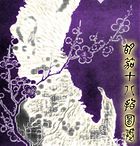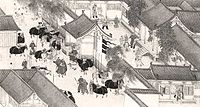
Eighteen Songs of a Nomad Flute
Encyclopedia

China
Chinese civilization may refer to:* China for more general discussion of the country.* Chinese culture* Greater China, the transnational community of ethnic Chinese.* History of China* Sinosphere, the area historically affected by Chinese culture...
songs and poems about the life of Han Dynasty
Han Dynasty
The Han Dynasty was the second imperial dynasty of China, preceded by the Qin Dynasty and succeeded by the Three Kingdoms . It was founded by the rebel leader Liu Bang, known posthumously as Emperor Gaozu of Han. It was briefly interrupted by the Xin Dynasty of the former regent Wang Mang...
(202 BCE – 220 CE) poet Cai Wenji
Cai Wenji
Cai Wenji , also known as Cai Yan, was a Han Dynasty poet and composer. She was the daughter of Cai Yong, also a musician. Her style name was originally Zhaoji, but it was changed to Wenji during the Jin Dynasty to avoid a naming conflict with Sima Zhao.She spent part of her life as a prisoner of...
, the songs were composed by Liu Shang, a poet of the middle Tang Dynasty
Tang Dynasty
The Tang Dynasty was an imperial dynasty of China preceded by the Sui Dynasty and followed by the Five Dynasties and Ten Kingdoms Period. It was founded by the Li family, who seized power during the decline and collapse of the Sui Empire...
. Later Emperor Gaozong of Song
Emperor Gaozong of Song
Emperor Gaozong , born Zhao Gou, was the tenth emperor of the Song Dynasty of China, and the first emperor of the Southern Song. He reigned from 1127 to 1162. He fled south after the Jurchens overran Kaifeng in the Jingkang Incident, hence the beginning of the Southern Song dynasty 1127–1279...
(1107–1187) commissioned a handscroll with the songs accompanied by 18 scenes painted.
Epitome


Han Dynasty
The Han Dynasty was the second imperial dynasty of China, preceded by the Qin Dynasty and succeeded by the Three Kingdoms . It was founded by the rebel leader Liu Bang, known posthumously as Emperor Gaozu of Han. It was briefly interrupted by the Xin Dynasty of the former regent Wang Mang...
man of letters, Cai Yong
Cai Yong
Cai Yong was a Chinese scholar of the Eastern Han Dynasty. He was well-versed in calligraphy, music, mathematics and astronomy. One of his daughters is the famous Cai Wenji.-Early life:...
. The family resided in Yu Prefecture, Chenliu Commandery, in what is now eastern Henan Province. Cai Wenji was born shortly before 178 CE, and was married at the age of sixteen according to the East Asian age reckoning
East Asian age reckoning
East Asian age reckoning is a concept and practice that originated in China and is widely used by other cultures in East Asia, which share this traditional way of counting a person's age. Newborns start at one year old, and each passing of a Lunar New Year, rather than the birthday, adds one year...
(corresponding to the age of 15 in Western reckoning) to Wei Zhongdao in 192 CE. Zhongdao died soon after the wedding, without any offspring. 194–195 CE brought Xiongnu
Xiongnu
The Xiongnu were ancient nomadic-based people that formed a state or confederation north of the agriculture-based empire of the Han Dynasty. Most of the information on the Xiongnu comes from Chinese sources...
nomads into the Chinese capital and Cai Wenji
Cai Wenji
Cai Wenji , also known as Cai Yan, was a Han Dynasty poet and composer. She was the daughter of Cai Yong, also a musician. Her style name was originally Zhaoji, but it was changed to Wenji during the Jin Dynasty to avoid a naming conflict with Sima Zhao.She spent part of her life as a prisoner of...
was taken, along with other hostages, into the frontier. During her captivity, she became the wife of the Zuoxianwang ('Leftside Virtuous King' or 'Wise King of the Left'), and bore him two sons. It was not until twelve years later that Cao Cao
Cao Cao
Cao Cao was a warlord and the penultimate chancellor of the Eastern Han Dynasty who rose to great power during the dynasty's final years. As one of the central figures of the Three Kingdoms period, he laid the foundations for what was to become the state of Cao Wei and was posthumously titled...
, the Chancellor of Han
Chancellor of China
The Chancellor , variously translated as Prime Minister, Chancellor of State, Premier or Chief Councillor, was a generic name given to the highest-ranking official in the imperial government in ancient China...
, ransomed her in the name of her father, who had already died before her capture. When Cai Wenji returned to her homeland, she left her children behind in the frontier.
Historical sequel
A number of poems have been written to immortalize Cai WenjiCai Wenji
Cai Wenji , also known as Cai Yan, was a Han Dynasty poet and composer. She was the daughter of Cai Yong, also a musician. Her style name was originally Zhaoji, but it was changed to Wenji during the Jin Dynasty to avoid a naming conflict with Sima Zhao.She spent part of her life as a prisoner of...
's life story including her own. Liu Shang (c. AD 770), wrote a poem about Cai Wenji
Cai Wenji
Cai Wenji , also known as Cai Yan, was a Han Dynasty poet and composer. She was the daughter of Cai Yong, also a musician. Her style name was originally Zhaoji, but it was changed to Wenji during the Jin Dynasty to avoid a naming conflict with Sima Zhao.She spent part of her life as a prisoner of...
called Hujia Shiba Pai (胡笳十八拍; "Eighteen Songs on a Nomad
Nomad
Nomadic people , commonly known as itinerants in modern-day contexts, are communities of people who move from one place to another, rather than settling permanently in one location. There are an estimated 30-40 million nomads in the world. Many cultures have traditionally been nomadic, but...
Flute"). Liu Shang's poem accompanied by 18 scenes painted on a handscroll was commissioned by the first emperor of the Emperor Gaozong of Song
Emperor Gaozong of Song
Emperor Gaozong , born Zhao Gou, was the tenth emperor of the Song Dynasty of China, and the first emperor of the Southern Song. He reigned from 1127 to 1162. He fled south after the Jurchens overran Kaifeng in the Jingkang Incident, hence the beginning of the Southern Song dynasty 1127–1279...
. Four fragments, presumed to be of the original, are in the Boston Museum of Fine Arts, while the earliest complete copy, apparently from the fourteenth century and formerly in the C. C. Wang collection, resides in the Metropolitan Museum of Art
Metropolitan Museum of Art
The Metropolitan Museum of Art is a renowned art museum in New York City. Its permanent collection contains more than two million works, divided into nineteen curatorial departments. The main building, located on the eastern edge of Central Park along Manhattan's Museum Mile, is one of the...
; these were published by the museum in 1974 in a book entitled Eighteen Songs of a Nomad Flute.
Allegorical device
Chinese allegorical devices, as defined by Erich AuerbachErich Auerbach
Erich Auerbach was a philologist and comparative scholar and critic of literature. His best-known work is Mimesis: The Representation of Reality in Western Literature, a history of representation in Western literature from ancient to modern times.-Biography:Auerbach, who was Jewish, was born in...
, are "something real and historical which announces something else that is also real and historical...the relation between the two events is related by an accord or similarity".
There are obvious parallels between Cai Wenji
Cai Wenji
Cai Wenji , also known as Cai Yan, was a Han Dynasty poet and composer. She was the daughter of Cai Yong, also a musician. Her style name was originally Zhaoji, but it was changed to Wenji during the Jin Dynasty to avoid a naming conflict with Sima Zhao.She spent part of her life as a prisoner of...
's story and that of Gaozong's mother, the Empress Dowager Wei (衛太后), who was captured along with the rest of the imperial clan and held hostage in the north. She was not released until a peace treaty was concluded between the Song Dynasty and the Jurchens in 1142. Despite its allegorical development derived from Cai Wenji
Cai Wenji
Cai Wenji , also known as Cai Yan, was a Han Dynasty poet and composer. She was the daughter of Cai Yong, also a musician. Her style name was originally Zhaoji, but it was changed to Wenji during the Jin Dynasty to avoid a naming conflict with Sima Zhao.She spent part of her life as a prisoner of...
's story, her image today reverberates primarily with the feeling of sorrow.
See also
- Chinese poetryChinese poetryChinese poetry is poetry written, spoken, or chanted in the Chinese language, which includes various versions of Chinese language, including Classical Chinese, Standard Chinese, Mandarin Chinese, Cantonese, Yue Chinese, as well as many other historical and vernacular varieties of the Chinese language...
- Han poetryHan poetryHan poetry refers to those types or styles of poetry particularly associated with the Han Dynasty era of China. This poetry reflects one of the poetry world's more important flowerings, as well as being a special period in Classical Chinese poetry, particularly in regard to a new style of shi...
- GuqinGuqinThe guqin is the modern name for a plucked seven-string Chinese musical instrument of the zither family...
- Music of ChinaMusic of ChinaChinese Music has been made since the dawn of Chinese civilization with documents and artifacts providing evidence of a well-developed musical culture as early as the Zhou Dynasty...
- Tang poetryTang poetryTang poetry refers to poetry written in or around the time of and in the characteristic style of China's Tang dynasty, and/or follows a certain style, often considered as the Golden Age of Chinese poetry...

